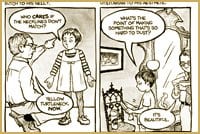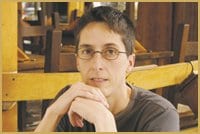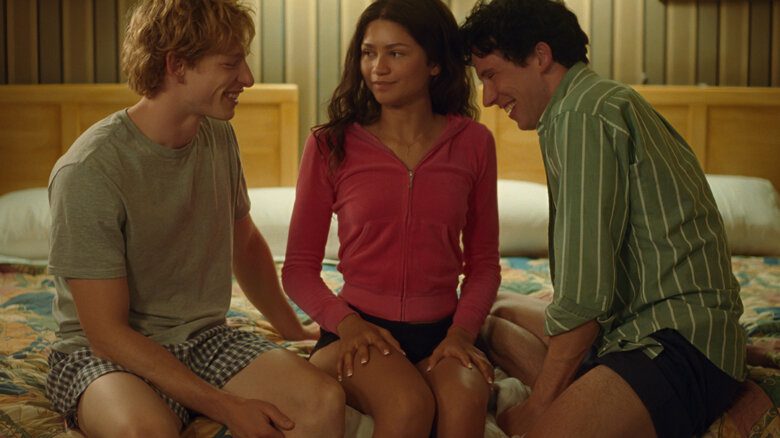
Credit: Greg Martin photo
For more than 20 years, Alison Bechdel has been the pen behind the wildly popular comic strip, Dykes to Watch Out For. Part political activist, part social commentator and part humorist, Bechdel has created a whole community of dykes, trans folk and the occasional het character and charted their lives and loves through innumerable affairs, aspirations and American administrations.
So you would think that a bit of her personal life has shone through the pages of her work.
Not entirely, but that is about to change.
With the release of her candid new book, Fun Home: A Family Tragicomic, Bechdel has finally opened up a lifetime of her secrets for all to see.
Fun Home is short for funeral home, the family business that her father, Bruce Bechdel, inherited. As the title implies, the work is both bitter and sweet, a journey that oscillates between the cartoonist’s more detached, analytical perspective on her past, and a deeper honesty she can no longer deny.
The book focuses primarily on her dissection of two prominent elements in her life so far: her love of fine literature and her coming out process. Tying those two threads together is her father–a complicated man who played a significant part in both his daughter’s art and her queer journey.
“I realized at some point in my process of writing this book that it was really about becoming an artist, and my apprenticeship as an artist under my father,” says Bechdel. “It was a tough apprenticeship and he was very judgmental and extremely overbearing. He wanted me to be an artist, to do things he hadn’t done.”
While away at university, the young Bechdel bloomed emotionally and creatively, eventually coming out to herself and her family. Her mother greeted her daughter’s announcement with a revelation of her own.
Mother Bechdel promptly outed her husband, telling Alison that her father–a local grade school English teacher–had a long history of sexual relations with men and teenaged boys.
“The first thing she said was ‘your father has had affairs’ and I was picturing women. Her next sentence was ‘With other men.’ Things started falling into place, but not immediately.
“Three weeks after my mom told me about him, my father wrote me a letter and in that letter it was assumed that I knew what he was talking about, but there was not a moment when my father came to me and said, ‘Alison, I’m gay.’ It never happened.”
To this day, Bechdel feels her coming out added another weight onto an already heavy family burden. “The way my mother reacted was very typical of the whole family dynamic, which is that my parents were in such distress, there was really no room for me to have any problems. When I came along with this information, she couldn’t compute.
“My father’s situation was extremely disgusting to her and I felt like I dredged this sad story up when they really weren’t thinking about it. I never seriously thought that I shouldn’t have done it, but I felt like it was bad timing.”
In publicly sharing these stories now, it is clear that Bechdel’s new book is no upbeat, dumbed-down cartoon; in fact, just the opposite. Fun Home is an in-depth analysis of a family–and its breaking points–from the inside.
“To boil it down to its crudest level, I think I wanted to show the anecdotal effects of homophobia in one family’s life. It is much more than that, I hope, but I guess that was sort of my mission.”
Four months after she came out to her family, Bechdel received a phone call informing her that her father had been hit by a truck and killed–an accident that to this day she believes might have been a suicide.
The timing of her father’s death was tragic on many levels, only one of which was her inability to process her queerness with him. “Several months after I came out, he was dead. We never really talked about it.
“I can’t get too upset about him not coming out, or I wouldn’t be here,” she continues, “but my father made the rest of us miserable because he wasn’t living the life he needed to be living. It trickled out and the damage goes on today. That said, my entire adult life and career has been my reaction to my father’s life. My choice to be out and open, to devote my life to keep talking about it.”
Years of counselling and consideration later, Bechdel finally decided to share her very private family’s story. She didn’t tell her mother she was writing Fun Home until the project was a full year into its seven-year gestation.
“I was very nervous about it,” she recalls. “She’s a private person and her friends don’t know this stuff. Over the years, I had gotten a lot of information from her and I guess she felt kind of betrayed by me going public with it. I felt bad about that, but I felt that it was something that I needed to do.”
Bechdel’s mother eventually came around and even gave her a box of letters from her father. “I got a lot of insight into my father from those. One of the strangest moments ever was reading my father’s love letters to my mother. I had never seen them being affectionate at all.”
Those letters and the couple’s early courtship–which included quotations from F Scott Fitzgerald and William Shakespeare–forged a bond that was intellectually stimulating, if not romantically so.
Growing up under the tutelage of such literarily fuelled parents offered Bechdel the opportunity to access great literature and language; yet she admits that her desire to rebel against her parents led her to the land of comic strips.
“My parents had passionate, creative interests; I carefully chose my own mode of expression so that I could elude their radar. In a way I became a cartoonist by default. It was one mode of expression that they didn’t know anything about, didn’t care about, and I could work without their scrutiny.
“Consequently,” she notes, “you don’t get taken seriously. I didn’t mind; I liked that. It enabled me to be free.”
That very freedom may now be in jeopardy as Fun Home garners unanticipated success, reaching a broader audience than Dykes to Watch Out For ever attained. Bechdel says she’s shocked by the attention–and concerned about its potential impact on her family.
“I’ll say one thing about this book: I didn’t expect it to be widely read! Dykes has a devoted but small audience of people I would feel safe telling this information to. This book is getting a very different reception, I’m getting much more mainstream attention. If I had known that in advance, I don’t know that I would have had the nerve to reveal all this stuff; I’m used to doing this under the radar.
“That being said, I have a confessional streak,” she confides. “I felt obliged to tell this story. My concern, however, is for my mother and my brothers. They didn’t sign up for this.”
One of the reasons Fun Home took seven long years to complete was Bechdel’s painstaking process of capturing as much literal and expressive detail as possible in every frame. “I took tens of thousands of photographs, dressing up and reenacting each scene to come up with each image,” she reveals.
“One very intense part of my photographic research was going back to the spot where my father was killed, standing there on the side of the road and taking pictures of trucks as they whooshed past. Even though I was acting things out matter-of-factly, the experience entered into my body in some way.
“I was in a jacket and tie at one point impersonating my father in a casket,” she continues. “I could either emotionally explore that or shutdown. I feel like I did both of those things.”
Bechdel says she may tackle more autobiographical tales in the future, but she doesn’t plan to leave her Dykes behind. “The strip is still really exciting to me. Especially at this point in history, as it is dissolving into totalitarianism. I just feel like this country is insane. It is seriously–we’re being ruled by psychopaths. The comic strip is just an outlet to vent my feelings about it,” she says.

 Why you can trust Xtra
Why you can trust Xtra


